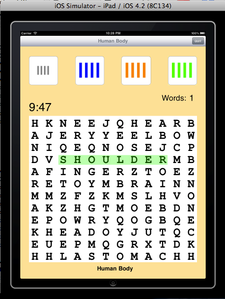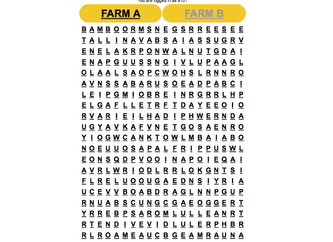I.
To
Go or to Stay: The Foraging Behavior in Two Interleaving Puzzles of Younger and Older Adults
The study used the word search puzzle paradigm to investigate the cognitive foraging behavior among younger and older adults. Older and younger adults were adaptive information seekers given that they both allocated more time to the richer patch and switches less often when the search cost was higher. However, older adults tended to switch fewer times and persist longer in the patch than younger adults regardless of the search cost. Results further showed that switch behavior was based on the individual reflection of information uptake, which long exploitation in the patch of older adults could not be solely explained by general slowing but their higher tolerance of the reduction of rate of gain. Overall, older adults expected to reach higher gains than younger adults before leaving a patch. The age-dependent adaptive foraging behavior was also discussed.
Publication:
Chin, J., Fu, W-T., & Stine-Morrow, E.A.L. (2011). To Go or to Stay: The foraging behavior in two interleaving puzzles of younger and older information seekers. Poster of the 52th Annual Meeting of the Psychonomic Society, Seattle, WA.
Publication:
Chin, J., Fu, W-T., & Stine-Morrow, E.A.L. (2011). To Go or to Stay: The foraging behavior in two interleaving puzzles of younger and older information seekers. Poster of the 52th Annual Meeting of the Psychonomic Society, Seattle, WA.
II.
Information Foraging across the Life Span: Search and Switch in Unknown Patches

In this study, I used a word search puzzle paradigm to investigate age differences in the rate of information gain (RG; i.e., word gain as a function of time) and the cues used to make patch-departure decisions in information foraging. The likelihood of patch departure increased as the profitability of the patch decreased generally. Both younger and older adults persisted past the point of optimality as defined by the marginal value theorem (Charnov, 1976), which assumes perfect knowledge of the foraging ecology. Nevertheless, there was evidence that adults were rational in terms of being sensitive to the change in RG for making the patch-departure decisions. However, given the limitations in cognitive resources and knowledge about the ecology, the estimation of RG may not be accurate. Younger adults were more likely to leave the puzzle as the long-term RG incrementally decreased, while older adults were more likely to leave a puzzle as the local RG decreased. However, older adults with better executive control were more likely to adjust their likelihood of patch-departure decisions to the long-term change of RG. Thus, age-dependent reliance on the long-term or local change of RG to make patch-departure decisions might be due to individual differences in executive control.
Publications:
Chin, J., Payne, B., Fu, W-T., Morrow, D. G. & Stine-Morrow, E. A. L. (2015). Information foraging across the life span: Search and switch in unknown patches. Topics in Cognitive Science, 7(3), 428-450. DOI:10.1111/tops.12147
Chin, J., Payne, B., Fu, W-T., Morrow, D., Stine-Morrow, E.A. L. (2012). Information foraging in the unknown patches across the life span. In N. Miyake, D. Peebles, & R. P. Cooper (Eds.), Proceedings of the 34th Annual Conference of the Cognitive Science Society (pp. 1404-1409). Austin, TX: Cognitive Science Society.
Publications:
Chin, J., Payne, B., Fu, W-T., Morrow, D. G. & Stine-Morrow, E. A. L. (2015). Information foraging across the life span: Search and switch in unknown patches. Topics in Cognitive Science, 7(3), 428-450. DOI:10.1111/tops.12147
Chin, J., Payne, B., Fu, W-T., Morrow, D., Stine-Morrow, E.A. L. (2012). Information foraging in the unknown patches across the life span. In N. Miyake, D. Peebles, & R. P. Cooper (Eds.), Proceedings of the 34th Annual Conference of the Cognitive Science Society (pp. 1404-1409). Austin, TX: Cognitive Science Society.
III. Computational Model of the Selection of Patch-Departure Decisions across the Life Span
This is an ongoing project to use ACT-R computational models to explain the underlying mechanism of patch-departure processes among adults with different ages. Professor Wai-Tat Fu of the Department of Computer Science is the supervisor for this project.
IV.
Age Differences in Search during Self-Regulated
Learning
Under the supervision of Professor Elizabeth Stine-Morrow, the study is to uncover the underlying fundamental mechanism in self-regulated learning by connecting literature in metacognition and foraging theories. While search has become a more important process for adult learners in regulating their own enrichment in contemporary education settings, there are few studies that have examined how learners determine the points at which to switch from exploitation (engagement of attention for encoding this information) to exploration (i.e., searching for new information). Given different trajectories of cognitive development across life span, whether age-related changes in cognitive functions affect the control mechanism in regulating learning across multiple information sources is unclear. The current study used the text foraging paradigm to examine this control mechanism in self-regulated learning among younger and older adults, especially on how learners make the decisions to stop learning one text for searching a new one. We manipulated the amount of new information and conceptual overlap across texts to create different trajectories of changes in perceived information gain for learners, and examined how learners regulate their study in different types of text patches. Results from this study would contribute to the existing literature in cognitive aging, information foraging and self-regulated learning, as well as have long-run implications for adult education.
Publications:
Chin, J. & Stine-Morrow, E. A. L. (2016). What Makes You Feel You Are Learning: Cues to Self-Regulated Learning. In A. Papafragou, D. Grodner, D. Mirman, J. C. Trueswell (Eds.), Proceedings of the 38th Annual Conference of the Cognitive Science Society (pp. 538-543). Austin, TX: Cognitive Science Society.
Publications:
Chin, J. & Stine-Morrow, E. A. L. (2016). What Makes You Feel You Are Learning: Cues to Self-Regulated Learning. In A. Papafragou, D. Grodner, D. Mirman, J. C. Trueswell (Eds.), Proceedings of the 38th Annual Conference of the Cognitive Science Society (pp. 538-543). Austin, TX: Cognitive Science Society.




